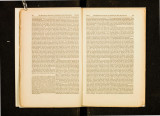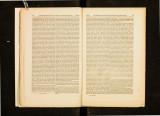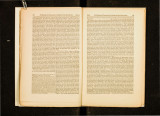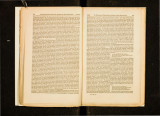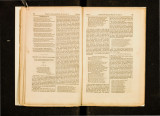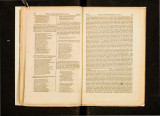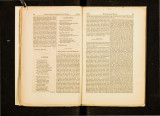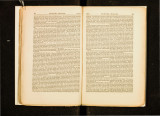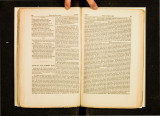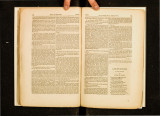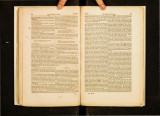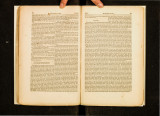| OCR Text |
Show 45 1 Tlw Massaclw.tells Proposition for Abolisln'ng the Slare Representation. [AUGUST, which we dcri1·e from them, it is entirely just that I as 0 repugnant to the first and vital principles of they should be grat ifie1l. T l1e Southern States pos· republican popula~ rcpr~sentat ion : to •.he self·e1·i· scsscrrtain st3ples, tobacco, rice, indigo, &c., '' hich dent truths prucl::umcd m the Deci:l ratton of I ndc. m11st be capital oOjects in treaties of conun~rce with r.endence: to ~he le.tter aud spirit of .the ?nnstitu. fOreign nations; 3ntl the at.! vantages wh1Ch they t1on of the Umted States, and to the !tberlles of the necess3 rily procme in those t reat ies, will be l't!lt whole people of all the frl"C St:~.tes." 1t was said throughout all the St3tes. But the justice of this by a great statesman of the last century, that, if he plan will appear in another view, 'Tile best writers could not give pcace to his country, he would ~i,·e on Go~.·ernmenthaveheldllwt ·represen latw,Jshou.ld peace (f) his conscience. \\'c doubt whether :O.tr. be compou11ded of persons and property.• This Adams will gi1·e peace to either. lt was rcscr\'ed rnle has been adopted, as far as it C•HIId be, in the for him to make the discnl'f•ry that the Federal Constitution of New-York. It will, howcl'er, by Convention,inal\owingthcslavcstobereprcsented, no means be admitted, that the slaves are consid- had, through gross ignorance or deliberate desig n, e red altogether as tJroperty, They are men, t hou~h ''iolated 11 the first and l'ital principlcs of repttb\i. degraded to the condition of s[a\•ery. They are can popular representJtiou." Were the members persons knnwn to 1he municip3llawa of tlte States of the Federal CO!l\'entiun now li\•i ng, they would which they inhabit, as weJI as to the laws of nature. be surprised to hear that so grave an indictment had But representation and ta:rotion go lo~etller-and been drawn up against them by an E x-President of one uniform rule ought to apply to both. Would the United St:1tes. Thf'y might smile at the delu· it be just to compute these slaves in the assessment sion of the a111hor, but in contemplating the won. of taxes, and discard them from the estimate in the derful resul ts which have flowed from the operation apportionment of representat i1•cs1 \ Vould it be just of that. Constitution which they created-in view. to impose a singular burden, \\ ithout conferring some ing the progress of the country, in population and adequate aclvantage1 Another circumstance ought power. wealth and renown, they could not fail to to be consi{lcred. The rule we h:we been speak- rear! their proud acquittal in the admiring eyes of ing of is al!encral rule, and applies to all the States. millions of freeme n. I nvoking the continued Uless· Now, you have a greal number of people in your ing-s of Providence upon their <'OUntry, and praying State, wlliclt are not represented at all, and have no that the edifice which thPy reared with so much voice in your govemment ; these will be included care and skill, might not Oe torn down by ruthless in theenum£>ration-not two-fifths- nor three-fifths, hands, they would await in cheerfulness their sum· but tile whole. T his pro\'eS that the ad1·antages of mons to another sphere of action, where their ears the plan are not confined to the Southern States, could never hear the disturbing voice of faction or hut extend to other parts of the Union." (EIIiol's fanaticism. Debates.) \ Ve see, then, that A \exander Hamilton E xperience, the best of political teachers, hac! so maintained that the Southern States had as just a fully convinced the mind of Mr. l\lad ison of the claim to representation for their slave labor as the justice and wisdom of allowing represcnt3tion for Northern States had fur t l1eir free labor. Let it three-fifths of the slave population, that, in 1820, be rcmemhered that he had the independence to after this principle had been in practical operation say this to the people of New. York, almost all of more than forty years, in the Federal Councils, he whose Jay-laborers were free white men. recomment.lcd its incorporation into the amended Renouncing the politic:il principles, the concilia- Constitution of Virginia. 11e rem:uked that," the tion and forbearance of the eminent patriots who rights of persous, and the rights of properly arc the framed the Constitution, John Quincey Adams ar· objects, for the protect ion of which Gove rnwent raigns the slave representation a nd condemns it was instituted. 'I'hese rights can not well be sepa· rated. The personal right to acquire property, . . . . which is a natural right, gives to property, when * A sproofoftlusposltJOnofGc~cr:•.lllamtlt~n,wemny ac uireJ a rioht to rotec..tion as a. social right. refer, arnong others, to Burke, who, 111 h1s He!lect10ns on the q ' "' P . .1 Frenc·h R('\'olur 1011, uses tht• fol!owinglangml£\'. "Nothing T he esse nee of Government IS power, anu power is a due and ndequatc rcpresPntation of a :5tute that does lodged in human hands will ever be liable to ahuse. not reJJresent its abillly, as v.cll ru it:t properly. But as • • I n Re publics, !he great danger is that the nhili t ~ is~ vigorous ."u.d a~tivc prineiple. aud as propc~ty i:.~ majority may not sufficiently respect the r ights of s~ugg1~h, 1n ~rt and tunul, ~~never can he .~afe from .thctnva. the minority. • • • • • The only effectual safe· ~~~~0:1~1 ~~~:~:~;~;~::snt::ti~~~ 0~: ~~~5~1~/;:i:;;~~~~~~~~f't: guard to the rights of the minority, must be l~id in in great mant• of accumulation, ar it;, 110t rightly protteted." such a basis and structure of the Go,•ernment ttself Jot.n Adams, the cldPr, in his defence of the American Con· as m3y afl'ord, in a certain deg-ree, directly or indi· stiturions said,'.' The eud toLe aimed at in the forrnarion rcctly a defensive authority in behalf of a minority of a represenratn•c assembly, seems .to be the seuse of the havin 17 ri17lJt on its side. To come more nearly p~opl~. ~he puhlic roice.; the perfeet1on of rhe por1n1it con· 10 the,.. subject before !he Committee, viz : that pe· :~~~:~::: :~~~:~etshs~ p~~~:·i:r:,o~r~::::;~,~~ ::~~;:u~~ cul iar featu re in our community, which calls fur a affair of ct~lcul.ltion." peculi3r dil'ision in the basis of our Government, T 1845.] The lifassachusells Proposition fur Abolishing lire Slave Representation. 455 mean the colored portion of our population. • • •1th e checks and balances of the Constitution. Those If we can incorporate that interest into the basis oflwho idolize the doctrine, that the majority must at onr system, it will be tlte most apposile and effec· all times, and under all circumstances, role the mi· tual security that can be devised. Such an arrange- nority, may, at some distant J ay, agitate this fjues· mrnt is recommended to me by many \'ery impor- tion, and seek. by destroying the Constitution, to tant considerationg. • • • Tl1ey are acted upon by deprive tho small S ta tes of the protection now our laws, and ha,·e an interest in our laws, They afl'orded them. may be considered as making a part, though a de· John Quincey Ad3ms and his son, Charles F. graded part of the families to which they belong. Adams, have asserted in their respecti\'e Reports, • • • T he Federal number, as it is called, is par· that the SJa,·e-holt.ling S tates have exercised, and ticularly recommended by its simplicity, its cer· do still exercise, a disproportionate and prepon· tainty, its stability and its permanency. • • • • derating influence in the national cc,lmci\s: that \Vllflthcr, therefore, we be fixing a basis of rf'prc- their citizens h:ne too often been honored with the sentation for the one branch or the other of our I highest oflices in the Government, and they con· L egislature, or for Uotli, in a combination with other elude, that all these things :rre to he attributed to principles, the Federal ratio is a favorile resO'Iu·ce the representation of the slave population. with me. 1t entered into my earliest dews of the I If the Southern States have exercised a preponsuhject, before this Convention was assembled ; aud derating influence in any sense, the circumstance is though I ha1·e kept my mind open, have listened tn I to be accounted fur, nut by the exislence of the every proposition which has be~n adv.anced, and sla. ve representation, but by the greater prevalence given to them all a candid consideration, 1 must of ambition and public spirit among such of her say, that in my judgment we shall uctwMely in pre· citizens as possessed leisure and wealth. Se\·enty felTing il to olhers which have been brought before years ago, Edmund Burke said before Parliament u~. 11 (Debates of the Yirginia Con,·cntion of 1820. in his speech on conciliation with America, that })age 538.) Such were the views of one who tl1e spirit of liberty was" more high and haughty11 scorned to act as the organ of faction, and \\ ho in the Southern than in the Northern colonies. sought not to become the leader in agit ation ormis. "In Virginia nnd the Caro\in3s, they have a vast chief. l\fr. l\ladison had supported the same prin- muhituile of slaves. \ \' bere this is the case, in cip!e in the Federal Convention of 1787, and the any part of the world, those who are free, are by obsen·ations which he made, and the rf> flections in far the most proud and jealous of their freedom. which he indulged during tho succeeding forty odd Freedom is to them not only an enjoyment, but a years, tPndcd only to confirm the opinions a\·owed kind of rank and privilege. Not seeing there that and acted upon in earlier life. freedom, as in counlrics where it is a common blcs. lf the slave representation was aholislted, the sing, and as broad and general as the air, may be spirit of inno\·ation, a spirit particularly excitable united with nmch abject toil, with g-reat misery, in Hepubli<'s, would not be arrested. The abroga· with all the exterior of scnitnde, liberty Iouks tion of one of the great compromises upon which among them like something that is more noble and the Constitution is based, would pave the way for liberal. 4 "' Such were a ll the ancient commonthe overthrow nf another. Should the sla1·c repre- weahhs- suc:h were our Gothic ancestors-such in sentation be withdrawn, the smaller and weaker our days were the Poles; and such will be all mas· States of the confederacy would ha1·e abundant ters uf s\a\'Cs, who are not sJa,•es themsel\'es., cause fUr appreltending a diminut ion of their power. These rcmarlis of Burke account fur Southern in· T heir delegates in the Federal Convention insisted flucncfl more correctly than the logic of John upon such an organization of the new Go1·ernment Quincey Adams. This high estimate of liberty did as would allow the se\'eral States equality of rcpre· exert an immense influence upon the character and sentation on the floor of the Senate. This was intellect of the S outh, and prompted her sons to requi red as a shield, by which the small States engage in the public scn·ice cheerfully and zealmight protect themseh·es against 11njust aud unequal ously. Their patriotism inspired confidence. The legislation, After a hard struggle, the more pow. popularity which they acquire<!, and the ldgh hon. erfu\ States conceded claims, which, if refused, ors which they receil'ed, wcre the just and appro. would ha1·c prCI'ented the adoption of the Consti· priate rewards of their de,·otion to the cause of tution. In 18•10, the aggregate population of B:hotle Hepublican Government, and not the homage reluc. lsland, Delaware and Vcrmout was less than haifa ta.ntly paid to the slave representation. million of souls; while the aggregate population of The relative rcprrscntation of the S la,·e .holding New. York, Pennsyh·ania and Ohio was more than and IJOn· Siave.holdingSiatesin Congress, disprO\'C'S fi\·e and a half miiliuns. T he six Senators reprc- the assertion of preponderating iuRuence on the senting less than half a million, exercise and pos- part of the South. The non-Slave-holding States sess in the Senate of the United States, powers as ha1·c now a majority of ,17 in the Huuse nf Heprf>great as those of the six Senators representing senlativcs, and by wit hdrawing the ~lave reprcscn· nearly s ix millions. Such things are the resul t of l:ltion,thc Sla\'e-holding States would lose 21 mcm· |







